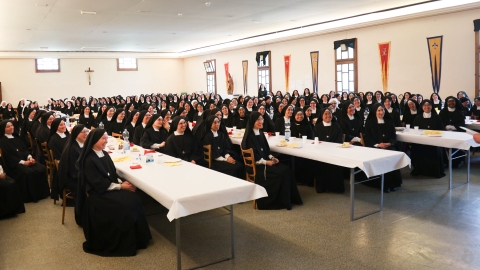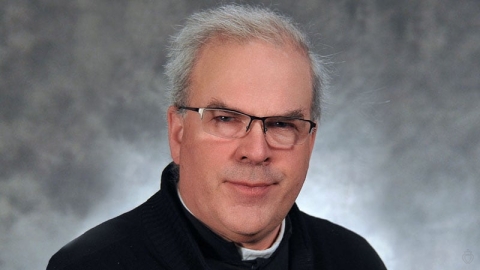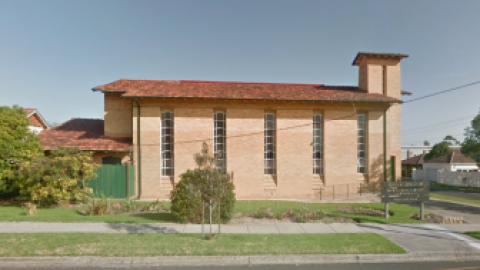Spiritual Communion
Union with God is the heart of the Christian life because the work of sanctification is primarily God's work in our souls. Our Lord has said it over and over again: "Without Me you can do nothing" (Jn 15: 5). Indeed, we cannot bear any fruit if we are not united to Our Lord, just as a branch cannot bear any bunch of grapes if it is not attached to the vine stock. The Christian life is essentially a life of union with God.
And of all the means God has given us to increase this union, the greatest and most effective, without a doubt, is Holy Communion. Several quotations from the discourse on the bread of life underline this great truth with unparalleled force: "He who eats my flesh and drinks my blood abides in me and I in him" (John, VI, 57); "As the living Father sent me and I live because of the Father, so he who eats me will also live because of me" (John, VI, 58). Can one imagine a more intimate and penetrating union?
From the excellence of Communion flows the many recommendations of spiritual authors in favor of frequent Communion, and this has always been the case. Thus Saint Augustine recommended that his faithful receive the Holy Eucharist often, and even daily: "This is your daily bread: receive it every day so that it may benefit you every day" (Saint Augustine, Sermon 28). It is every day, in fact, that we need this marvellous remedy, invented by Infinite Goodness, to erase in our souls the consequences of sin and to make us live more and more of the very life of God. It cannot be said enough what benefit our souls derive from this daily union with the Divine Victim offered on our altars. May those who have the possibility of going to Mass in this way each day thank Providence for it, and above all may they take advantage of it. What a pity it would be to remain a thirsty soul when one is within reach of the fountain of life!
But sometimes it is not possible to come to the chapel for Sacramental Communion. This may be due to distance or one’s duty of state which prevents one from coming every day. It may even be a circumstance such that Sunday Mass becomes impossible, for example for those who are ill. Faced with the impossibility of Sacramental Communion, there is a very simple way to participate in the effects of this Divine Sacrament: Spiritual Communion. St. Francis de Sales writes: "But when you cannot have the goodness of truly receiving at Holy Mass, at least receive communion of heart and spirit, uniting yourselves with an ardent desire to this life-giving flesh of the Saviour" (Introduction to the Devout Life, Part 2, chap. 21).
In order to better understand the theological foundation of this commendable practice, it is necessary to see that union with God in the Holy Eucharist is twofold: it is both physical and spiritual. Sacramental union is made through the reception of Our Lord who is truly present, in flesh and blood. His Body, Blood, Soul and Divinity are truly present as in the tabernacle. The faithful rising from the Holy Table is like a ciborium, bearing within himself his Lord and his God.
From this first union flows the spiritual union of the soul with God, as an effect flows from its cause. This interpenetration of Our Lord and His creature is an unfathomable mystery, a true marvel of the Goodness of God. Let us recall the words of Our Lord quoted above: "Whoever eats my Flesh and drinks my Blood abides in Me and I in him". The soul, thus spiritually united to its God, sees the bonds of charity that unite it to Our Lord become tighter. The ties to sin are loosened, the will is strengthened in goodness. It is the perfect fulfilment of the promise of Our Lord: "He who eats me will live by me". Moreover, this intimate and sanctifying presence of Our Lord is not fleeting. Contrary to the real and Sacramental presence of Jesus, which lasts only as long as the Eucharistic species last, the spiritual union of the soul with its God is prolonged without limit of time, and each new Communion revives it, increases it and renews its marvellous effects.
Eucharistic Communion operates in us this double sacramental and spiritual union, and this by the very force of the Sacrament. Spiritual Communion, on the other hand, operates in our soul the spiritual union with God without passing through the Sacramental union. Concretely, what we call Spiritual Communion is simply the act of desire to be united to Jesus in the Eucharist. Thus the Dictionary of Catholic Theology quoting the Council of Trent states: "To commune spiritually is to unite oneself to Jesus Christ present in the Eucharist, not by receiving him Sacramentally, but by a desire proceeding from a faith animated by charity. "(Council of Trent, session 13, c. 8). In fact, God is not bound by His Sacraments: when a sacramental act is impossible, an effective desire can make up for it. The Sacrament is a sensitive sign that produces grace. The efficacious desire reaches sacramental grace without passing through the sign. Formally, therefore, it is the actual desire to receive Communion—or to unite with Jesus in the Eucharist—that constitutes Spiritual Communion.
The practice of this exercise is very simple.
Before communion: one prepares oneself as one would prepare for Sacramental Communion. In particular, it is as a friend that one must receive Our Lord. It is therefore necessary to banish from our soul sin and the occasion of sin. The Church has the Confiteor recited before Sacramental Communion: the same prayer can be recited with great benefit before spiritual communion. If one has had the misfortune of losing grace, one must first make the most perfect possible act of contrition. It should be noted that, unlike Sacramental Communion, for spiritual communion Confession is not absolutely required; perfect contrition combined with the desire to confess as soon as possible is sufficient.
During communion: an act of desire is recited. There are many well composed prayers for this (see the prayer of St. Alphonsus Liguori in the insert), and one can also pray from the abundance of the heart, telling God how much we want to unite ourselves to Him.
After communion: the fulfilled soul thanks its Lord for its visit and gives thanks as one usually does after Sacramental Communion.
Here in a few words is the practice of spiritual communion, an exercise so sanctifying and so easy that one wonders how it is that it is so ignored. There is no limit to its frequency and it is possible to have spiritual communion several times in the same day. Each time, spiritual union with God makes Charity grow in us and rekindles our fervour in the service of God. God wants us to be holy and His Providence always gives us the means to do so. In the impossibility of Sacramental Communion, the faithful who wish to unite themselves to their God can open their souls spiritually to Him and thus participate in the marvellous effects of Holy Communion: "He who eats my flesh and drinks my blood abides in me and I in him, and I will raise him up at the last day".
One Act of Spiritual Communion
My Jesus, I believe that Thou art truly present in the Most Blessed Sacrament. I love Thee above all things, and I desire to possess Thee within my soul. Since I am unable now to receive Thee sacramentally, come at least spiritually into my heart. I embrace Thee as being already there, and unite myself wholly to Thee; never permit me to be separated from Thee.
Source : Abbé Benoît Storez, FSSPX





